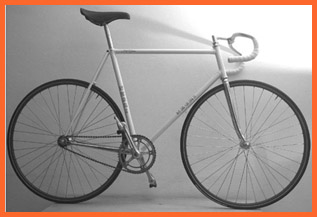
Thoughts on the Track Bike,
by Spencer Hall
Editor's note: Here's a think-piece, an extended meditation on the beauty and perfection of the track bike. One of Spencer's points is that because of the track bike's supreme adaptation of form to function, it simply disappears when you are riding it. This, he says, is perfection. Spencer also mentions Antoine de Saint-Exupery (1900-1944). Saint-Exupery was an aviator, but he was more well known for his beloved children's story "The Little Prince".
I have, of late, been struck by the arresting beauty of a clean and simple track bike. I have endeavored to illuminate the qualities which the track bike presents to the beholder, and methinks it is that most noble aspiration to simplicity that is manifested in the absence of frivolous accoutrements that obscure the finer attributes of most other bicycles. To illustrate this better than I ever could, here is a quote from Antoine de Saint-Exupery's Wind, Sand and Stars. (Ed. note, this is an adventure story about his experiences as a mail pilot in the 1920's-30's.) He was a reconnaissance pilot during WW2 and, previously, a mail pilot, flying at a time when, in his words, "engines would fall out in mid-flight". Here he speaks of his tool, the airplane:
"In anything at all, perfection is finally attained not when there is no longer anything to add, but when there is no longer anything to take away, when a body has been stripped down to its nakedness."
It results from this that perfection of invention touches hands with absence of invention, as if that line which the human eye will follow with effortless delight were a line that had not been invented but simply discovered.
"Meanwhile, startling as it is that all visible evidence of invention should have been refined out of this instrument and that there should be delivered to us an object as natural as a pebble polished by the waves, it is equally wonderful that he who uses this instrument should be able to forget that it is a machine."
Indeed, indeed!
I think part of the joy that comes from the riding of such a finely tuned instrument is in the continuity of the experience, i.e. the absence of the interruption of coasting which occurs on a freewheel machine.
All the great thinkers have obsessed over the benefits of walking to the act of thinking, and it occurs to me that perhaps the cause of this has to do in part with the rhythm which the regular steps present. I have found the same to be the case with the fixed gear machine; the unbroken cadence that must be maintained presents also an unbroken cadence for the mind to follow. Even when stopped, the effortless trackstand converts what would elsewhere be a gap in the experience into an integral part of the seamless whole.
Thus I have concluded that the perfect bicycle does not exist, which is not to say that it belongs to nonexistence, but that the bicycle disappears from the riders mind. In this sense, the bicycle and rider and ride merge into one. That is perfection.
© Spencer Hall, 2004
Back to Top